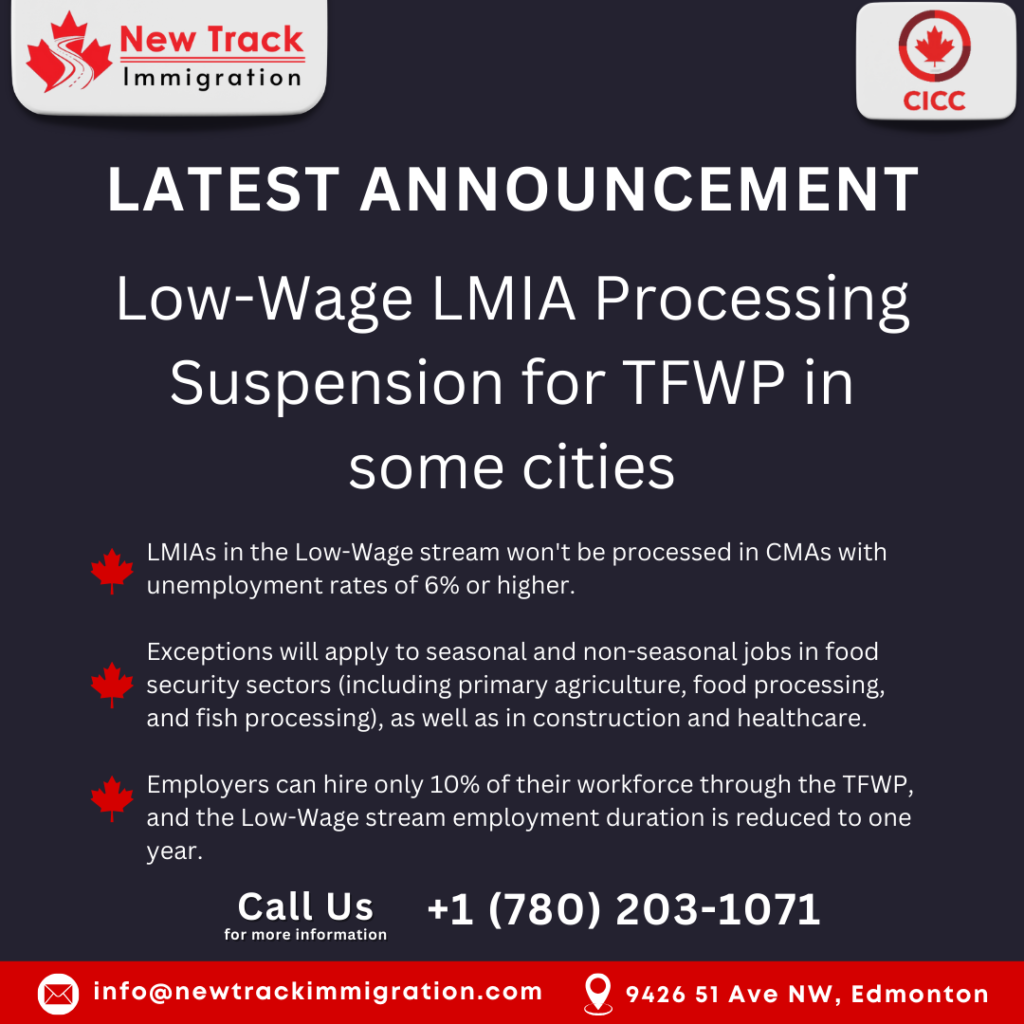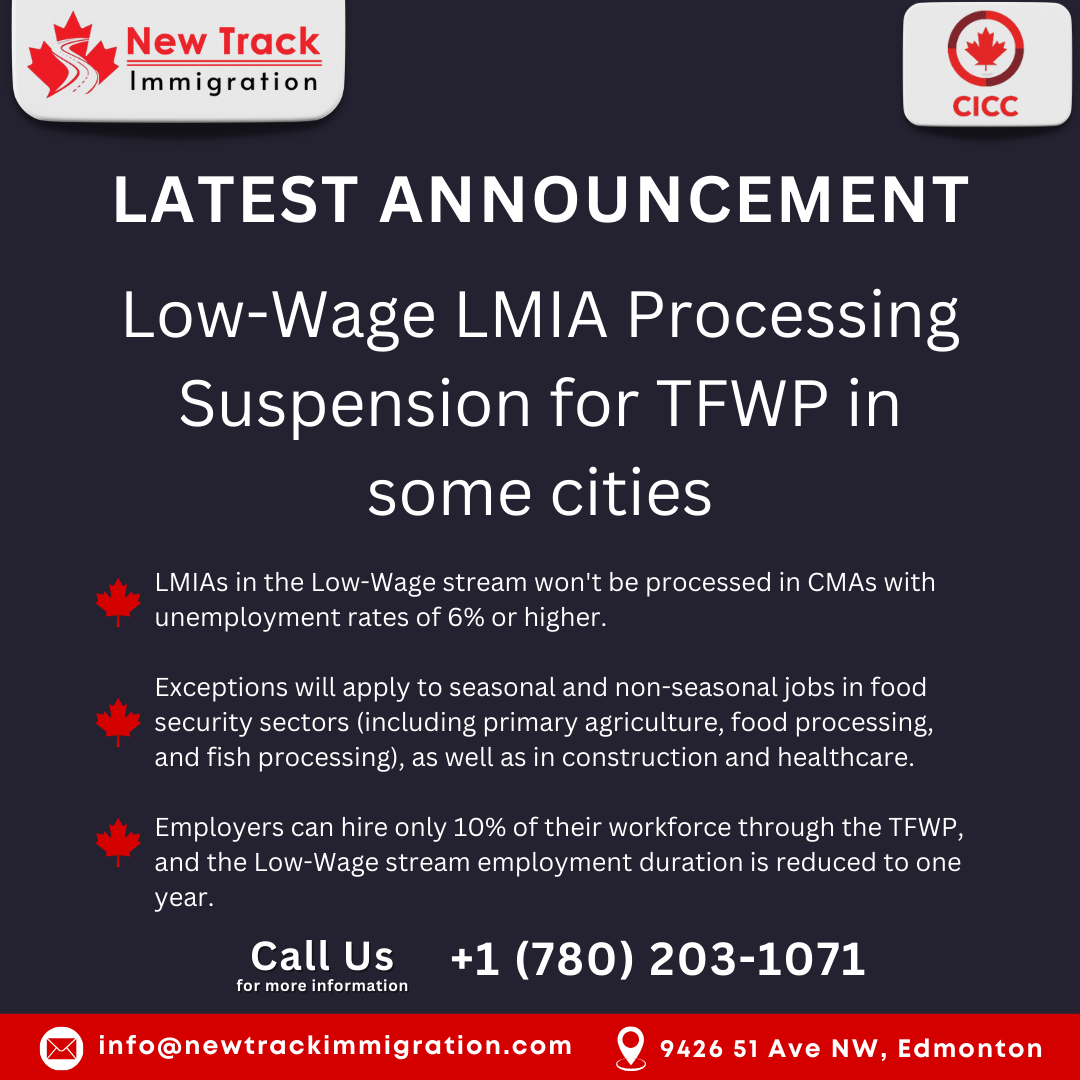Low-Wage LMIA Processing Suspension for TFWP in some cities: The recent Low-Wage LMIA processing suspension in Canadian cities has raised significant concerns among workers and employers alike. As part of the government’s ongoing adjustments to the Temporary Foreign Worker Program (TFWP). These changes are intended to deal with rising unemployment rates and ensure that job opportunities prioritize Canadian citizens. However, the effects of this suspension extend beyond just the immediate workforce, affecting various sectors and communities across the country.
Understanding the LMIA Processing Suspension

The Low-Wage LMIA processing suspension primarily targets Census Metropolitan Areas (CMAs) with unemployment rates of 6% or higher. The government has decided to halt the processing of Labor Market Impact Assessments (LMIAs) for low-wage positions in these areas. This decision is based on the need to reduce the dependency on foreign workers for low-wage jobs, thereby giving local workers a better chance at employment. Also, the move is part of broader changes to the Temporary Foreign Worker Program (TFWP). It reflects the government’s commitment to addressing challenges in the labor market.
Impact on Temporary Foreign Worker Program (TFWP)
The Low-Wage LMIA processing suspension has significant impacts on the Temporary Foreign Worker Program (TFWP). With this suspension, employers in affected areas will no longer be able to hire foreign workers for low-wage positions through the LMIA process. Consequently, this change is expected to put considerable pressure on employers, particularly in industries that have historically relied on foreign workers to fill labor shortages. Moreover, sectors like hospitality, agriculture, and seasonal employment in Canada are likely to feel the most impact, as these industries often depend heavily on low-wage foreign workers.
Positive Economic Benefits Continue for Express Entry Candidates
Canadian Unemployment Rate and Policy Changes
The Low-Wage LMIA processing suspension is closely tied to the Canadian unemployment rate. With unemployment rates rising in many CMAs, the government has introduced these changes to ensure that job opportunities are available to Canadians first. Also, by restricting the hiring of foreign workers for low-wage positions, the government aims to reduce the unemployment rate. This approach is intended to create more jobs for Canadian citizens. However, this policy change also raises questions about the availability of labor for certain industries that struggle to attract local workers.
LMIA Exemptions and Restrictions
While the Low-Wage LMIA processing suspension affects many areas, there are exemptions and restrictions in place. Certain sectors, such as food security, healthcare, and construction, are exempt from this suspension due to their critical importance to the economy and public welfare. These exemptions highlight the government’s recognition of the unique challenges faced by these industries and the need to maintain a steady workforce despite the broader restrictions.
Broader Changes to TFWP Policies

The Low-Wage LMIA processing suspension is part of a larger set of changes to TFWP policies. The government is also considering a review of the high-wage stream and other aspects of the program to ensure that it aligns with the current economic environment. Employment and Social Development Canada (ESDC) is expected to play a crucial role in regulating these changes. Also, they will ensure that the TFWP continues to meet the needs of the Canadian labor market.
Quebec Suspends LMIA Processing for Low-Wage Workers
Managing the Effect
The Low-Wage LMIA processing suspension marks a significant shift in how Canada manages its labor market and foreign worker policies. Although the goal is to lower unemployment and give Canadian workers priority, it is impossible to overlook the effects on low-wage workers, employers, and particular industries. Moreover, as these changes occur, it is crucial for stakeholders to adjust to the new environment. In response to these shifts, they must explore alternative solutions to address labor shortages in affected areas. By staying informed and prepared, both employers and workers can better navigate the challenges posed by this suspension. Additionally, they must remain adaptable to the constantly changing TFWP policies.
Reach us at:
Schedule an appointment with us HERE to connect with a licensed RCIC immigration consultant today. We’ll guide you through every step.
If you’re concerned about how the recent LMIA changes might affect your immigration plans, Newtrack Immigration is here to help. Our experienced team can guide you through these new regulations and explore alternative pathways that align with your goals. Don’t let policy changes disrupt your journey—contact Newtrack Immigration today for a personalized consultation and secure your future in Canada.









